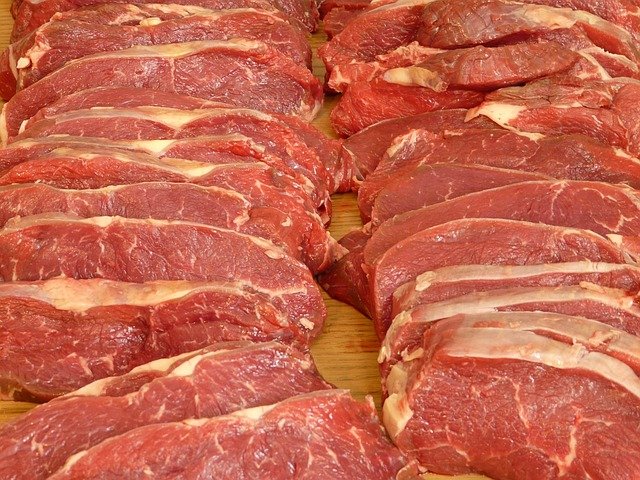
-
President Rodrigo Duterte has recommended increasing the minimum access volume for pork imports by 350,000 metric tons in addition to the current 54,210 MT MAV for this year
-
This is to immediately augment the supply of pork, stabilize increasing prices, and address the pressing issues on food security
-
Farmers’ and hog growers’ groups slammed the recommendation, raising concerns it will hurt local hog growers
President Rodrigo Duterte has recommended the increase in the minimum access volume (MAV) for pork imports by 350,000 metric tons (MT) in addition to the current 54,210 MT MAV for this year, according to presidential spokesperson Harry Roque.
“This is to immediately augment the supply of pork, stabilize increasing prices, and address the pressing issues on food security,” Roque said in a statement on March 26, confirming that Duterte’s recommendation was sent to Congress through a letter.
The MAV refers to the volume of quantity of a specific agricultural commodity that may be imported with a lower tariff.
The Department of Agriculture (DA) last February formally requested raising the MAV for pork imports to 400,00 MT to address supply shortage and high prices due to the outbreak of African Swine Fever (ASF) and alleged manipulation of market prices.
DA said Duterte in a meeting on February 3 approved the proposal “in principle.”
READ: Duterte oks ‘in principle’ more pork imports; hog raisers get transport subsidy
Farmers’ and hog growers’ groups, however, have slammed the proposal.
“The timing of the letter reeks of cowardice. Congress has not been given the chance to deliberate on the matter since the Department of Agriculture knew it can never justify its proposal on a fair platform,” Samahang Industriya ng Agrikultura (SINAG) said in a statement. Congress is on a break and will resume on May 17.
SINAG said it is not against importation per se, but pointed out that under the current tariff structure, importers are still able to bring in all the shipments they want and make a profit from it.
The Agricultural Sector Alliance of the Philippines party list also expressed concern that DA’s proposal to increase pork meat importation through MAV expansion and impose reduced tariff will kill the local industry.
Senator Francis Pangilinan in a separate statement also requested the government to declare a state of calamity to help hog-raisers recover from the devastating effects of the ASF instead of allowing “pork imports to flood the market.”
On March 15, senators adopted Pangilinan’s Senate Resolution No. 676 which urges DA to “recommend to the President to declare a state of national calamity” due to the “severe impact” of the ASF on the hog industry.
The resolution noted that the declaration would trigger the use of the National Disaster Risk Reduction and Management Fund and Quick Response Fund to supplement DA’s efforts to contain and manage ASF. For 2021, it is estimated that P8 billion is needed to place ASF under control.
Pangilinan noted that Senate hearings on rising pork prices revealed that importers already earn off the current cap on pork imports.
“Hindi na kailangan pang i-expand ang MAV at/o pababain ang taripa. Pinapayagan ng sistema natin ngayon ang pag-import ng baboy (There is no need to expand MAV and/or lower the tariff rates. Our present system allows the import of pork),” Pangilinan said.
Senator Panfilo Lacson has also pushed for a Senate investigation into the activities of an alleged syndicate within the DA that stands to gain billions of pesos in “tong-pats” (padded costs) from the recommendation to increase the MAV and lower tariff rates on imported pork.
In response, DA has created a special committee to look into allegations, while insisting that “the issuance of MAV in-quota allocation is above-board and non-discretionary.”
READ: DA to probe syndicate in meat import program
The Meat Importers and Traders Association, however, favored the proposal to increase the MAV quota, saying it is a step in the right direction to increase the supply of pork.
The Cold Chain Association of the Philippines, meanwhile, said that while importing 400,00 MT of pork is “per se normal,” potential logistics problems could ensue if the 400,000 MT “materialize over a short period of time,” and suggested that there has to be a “calibrated response” to the supply issue.
READ: Cold chain group sees logistics challenges with DA pork import plan
ASF, whose first outbreak in the country was recorded in 2019, has disrupted the operations of hog growers in Luzon, prompting the need for supply to be shipped in from Visayas and Mindanao.
About 95% of pork supply in the Philippines is locally sourced, and while the ASF virus does not pose any health risks to humans, there is no known vaccine to prevent it from spreading to the local livestock and destroying the industry.
The Philippine government earlier placed a 60-day price cap on pork and chicken products in Metro Manila to contain rising prices.




